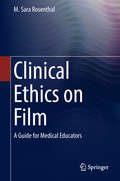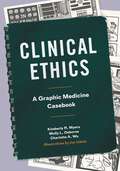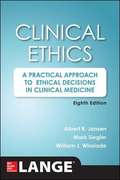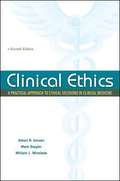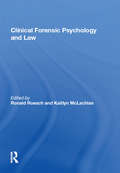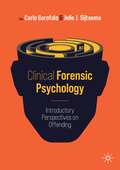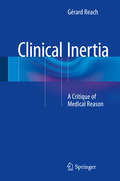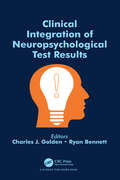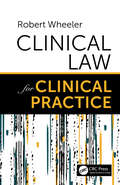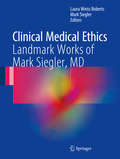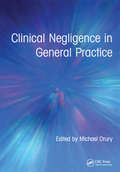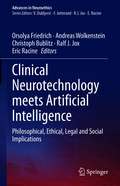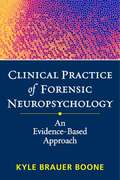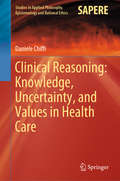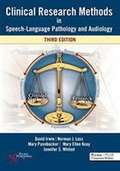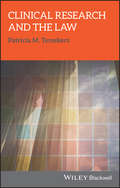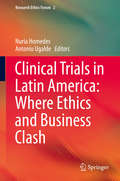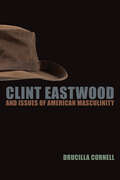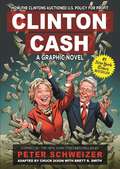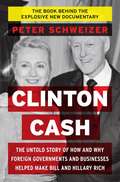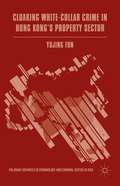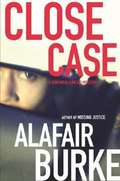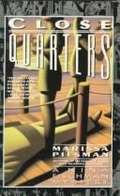- Table View
- List View
Clinical Ethics on Film: A Guide for Medical Educators
by M. Sara RosenthalThis book discusses feature films that enrich our understanding of doctor-patient dilemmas. The book comprises general clinical ethics themes and principles and is written in accessible language. Each theme is discussed and illuminated in chapters devoted to a particular film. Chapters start with a discussion of the film itself, which shares details behind the making of the film; critical reception; casting and other facts about production. The chapter situates the film in a history of medicine and medical sociology context, analyzes ethical issues raised in the film from a clinical ethics lens, and explains to readers how to use each film as a teaching aid for clinical ethics. Readers will understand how each film in this collection served to bring particular clinical ethics issues to the public’s attention, or reflected medico-legal issues that were part of the public discourse. The book is a perfect instructor's guide for anyone teaching bioethics, healthcare ethics, medical sociology, medical history, healthcare systems narrative medicine, or nursing ethics.
Clinical Ethics: A Graphic Medicine Casebook (Graphic Medicine)
by Kimberly R. Myers Molly L. Osborne Charlotte A. WuMr. Ito’s children act as his informal translators, but his doctor isn’t sure their translations are accurate or complete. Is Mr. Ito getting the medical information he needs?Ten-year-old Hannah arrives for her checkup with a bruised nose and an irritable father. Medical student Melanie is concerned for Hannah’s safety but wary of making accusations without evidence.Dr. Joshi worries that her patient is putting her husband, who is also Dr. Joshi’s patient, at risk by concealing a sexually transmitted disease. How can she act in the interest of both husband and wife without compromising doctor-patient confidentiality?Using the accessible and richly layered medium of comics, this collection reveals how ethical dilemmas in medical practice play out in real life. Designed for the classroom, Clinical Ethics provides an excellent introduction to medical ethics and presents case studies that will spark meaningful discussions among students and practitioners. The topics covered include patient autonomy, informed consent, unconscious bias, mandated reporting, confidentiality, medical mistakes, surrogate decision-making, and futility. The “Questions for Further Reflection” and “Related Readings” sections provide additional materials for a deeper exploration of the issues.Co-created by experts in clinical medicine, ethics, literature, and comics, Clinical Ethics presents a new way for students and practitioners to engage with fundamental concerns in medical ethics.
Clinical Ethics: A Practical Approach to Ethical Decisions in Clinical Medicine
by Albert R. Jonsen William J. Winslade Mark SieglerTrust the proven "Four Box" method to formulate ethically appropriate recommendations for patient care. Clinical Ethics teaches healthcare providers how to effectively identify, evaluate, and resolve ethical issues in clinical medicine. Using the author acclaimed "Four Box Method" and numerous illustrative case examples, this book enables practitioners to gain a better understanding of the complexities involved in ethical cases and demonstrates how to reach resolution to ethical problems. Clinical Ethics goes beyond theory to offer a decision-making strategy applicable to real-world practice. Readers will learn an easy-to-apply system based on simple questions about medical indications, patient preferences, quality of life, and contextual features that clearly explain clinical ethics and help them formulate a sound diagnosis and treatment strategy. The case examples have been selected to demonstrate how principles apply to real-world everyday practice. The co-authors, a bioethicist, a physician and a lawyer/ psychoanalyst /philosopher, draw on more than forty years respectively of clinical experience to select exemplary cases of ethical problems and to reflect on how moral principles and concepts can guide clinicians in formulating ethically appropriate recommendations for patient care. A unique chapter organization: Each chapter of the book begins with some general considerations about the topic, and the ethical principle relevant to that topic. The clinical situations that generate ethical problems are then described and illustrated by clinically realistic medical cases. A short distillation of current opinion from the bioethical literature is provided, followed by an analysis of the cases. . The authors conclude with recommendations that the three authors have formulated from their extensive experience as bioethics consultants.
Clinical Ethics: A Practical Approach to Ethical Decisions in Clinical Medicine (Seventh Edition)
by Albert R. Jonsen William J. Winslade Mark SieglerThis book is about the ethical issues that clinicians encounter in caring for patients such as informed consent, truth telling, confidentiality, privacy, the distinction between research and clinical care, and end-of-life care.
Clinical Forensic Psychology and Law (International Library Of Psychology)
by Kaitlyn McLachlanClinical Forensic Psychology and Law is a compilation of recent and classic articles providing comprehensive coverage of the field of clinical forensic psychology and law. Selected articles sample the major areas of the discipline, including criminal and civil forensic assessment, forensic treatment, youth assessment and intervention, and professional and ethical issues in forensic practice. The volume is designed for use by scholars, graduates and undergraduates in psychology and law schools.
Clinical Forensic Psychology: Introductory Perspectives on Offending
by Carlo Garofalo Jelle J. SijtsemaThis book represents a comprehensive collection of theoretical and empirical work at the nexus of clinical and forensic psychology written by world-renowned experts in the field. It is among the first books in the field to focus entirely on clinical psychological science applied to the understanding and treatment of offending. Part I addresses the main theoretical and clinical models used to explain and predict antisocial behavior, spanning biological, cognitive, experimental, individual differences, and interpersonal perspectives. Part II focuses on forms of psychopathology associated with an increased tendency to offend, with the emphasis on describing the clinical constructs most relevant for forensic psychology. Each chapter describes the clinical characteristics of one form of psychopathology, their assessment, their links with antisocial behavior, and treatment considerations. Part III focuses on different types of offense or offender groups as starting points. This perspective has relevance since many criminal justice and forensic mental health systems allocate offenders to interventions based on their index offense (or history of offenses). Finally, Part IV addresses the application of clinical psychology in the service of assessment and treatment in forensic settings. It includes the state of the art on diagnostic and risk assessment, as well as both widely used and recently developed interventions. This book is an excellent resource for students at both Bachelor’s and Master’s level, while also representing a comprehensive handbook for experienced researchers and practitioners.
Clinical Inertia: A Critique of Medical Reason
by Gérard ReachClinical practice guidelines were initially developed within the context of evidence-based medicine with the goal of putting medical research findings into practice. However, physicians do not always follow them, even when they seem to apply to the particular patient they have to treat. This phenomenon, known as clinical inertia, represents a significant obstacle to the efficiency of care and a major public health problem, the extent of which is demonstrated in this book. An analysis of its causes shows that it stems from a discrepancy between the objective, essentially statistical nature of evidence-based medicine on the one hand and the physician's own complex, subjective view (referred to here as "medical reason") on the other. This book proposes a critique of medical reason that may help to reconcile the principles of evidence-based medicine and individual practice. The author is a diabetologist and Professor of Endocrinology, Diabetology and Metabolic Diseases at Paris 13 University. He has authored several books, including one to be published by Springer (Philosophy and Medicine series) under the title: The Mental Mechanisms of Patient Adherence to Long Term Therapies, Mind and Care. , Diabetology and Metabolic Diseases at the Paris 13-University. He has also published Pourquoi Se soigne-t-on, Enquête sur la rationalité morale de l'observance (2007), Clinique de l'Observance, L'Exemple des diabètes (2006), and Une théorie du soin, Souci et amour face à la maladie (2010). An English adaptation of the first book is published by Springer (Philosophy and Medicine) under the title: The Mental Mechanisms of Patient Adherence to Long Term Therapies, Mind and Care.
Clinical Integration of Neuropsychological Test Results
by Charles J. Golden Ryan BennettThe interpretation of neuropsychological tests is a complex process which requires recognition of the multiple skills required to complete even the simplest tests. The purpose of this volume is to explore the various interpretive strategies used with a wide variety of commonly used tests in order to see beyond the skills suggested by the test title. By integrating these possible interpretations across multiple tests, the neuropsychologist can pinpoint those deficits which lie at the core of a client’s pattern of test results. It is intended for both professionals and for students starting to learn the clinical practice of neuropsychology.
Clinical Law for Clinical Practice
by Robert WheelerClinicians must practice medicine in conformity with regulatory requirements. That is the daily challenge, and those requirements have been founded on medical law. This book describes clinical law. A series of 60 brief commentaries are described, each setting out an important clinical legal case decided in an English court. The clinical relevance of the judgement is explained, together with how it should influence the care of the patient. Clinical readers are given skeleton guidance by their regulators, but almost no specific tuition as to how to apply it. This book sets out how clinical law has been applied in numerous cases, and thus provides guidance which is directly applicable to every clinician’s practice in the United Kingdom. Although most court cases concentrate on the medical aspects of patients’ care, the common currencies within clinical law touch on all clinical professions. Doctors, physiotherapists and others take consent every day; pharmacists must protect confidentiality; speech therapists consider the capacity of their patients; and nurses wrestle with discussions relating to whether their patients wish to be resuscitated The book is directed at members of the eight regulated clinical professions, the lawyers who deal with disputes, and all potential patients. About the Author Robert Wheeler, FRCS MS LLB(Hons) LLM, is a Consultant Neonatal and Paediatric Surgeon. He is the Associate Medical Director for the Department of Clinical Law, University Hospital of Southampton, Southampton Hampshire, England. https://www.uhs.nhs.uk/HealthProfessionals/Clinical-law-updates/Clinicallawupdates.aspx
Clinical Legal Education
by Dr N. R. Madhava MenonA Handbook on Clinical Legal Education, edited by Dr. N. R. Madhava Menon, is a pioneering work aimed at transforming Indian legal education through the integration of practical training and professional skill development. The book critiques the traditional, theory-heavy legal instruction and argues for a curriculum that includes experiential learning through clinical methods such as legal aid, moot courts, client counselling, and public interest litigation. Drawing inspiration from global models—especially U.S. legal clinics—it advocates for a learner-centric, skill-based, and socially responsive pedagogy. The book is structured into three parts: theoretical foundations, mechanics of clinical teaching, and statutory guidelines. It emphasizes the urgent need for law schools and universities to collaborate with the Bar Council of India to ensure quality legal education aligned with societal needs. Through case studies, role-play simulations, and guidelines, the handbook provides actionable frameworks for teachers and institutions to implement clinical legal education effectively. It stands as a call to action for educators, policymakers, and practitioners to reshape the legal profession in India, making it more competent, ethical, and inclusive.
Clinical Medical Ethics: Landmark Works of Mark Siegler, MD
by Laura Weiss Roberts Mark SieglerThis instant gold standard title is a major contribution to the field of clinical medical ethics and will be used widely for reference and teaching purposes for years to come. Throughout his career, Mark Siegler, MD, has written on topics ranging from the teaching of clinical medical ethics to end-of-life decision-making and the ethics of advances in technology. With more than 200 journal publications and 60 book chapters published in this area over the course of his illustrious career, Dr. Siegler has become the pre-eminent scholar and teacher in the field. Indeed his work has had a profound impact on a range of therapeutic areas, especially internal medicine, pediatrics, surgery, oncology, and medical education. Having grown steadily in importance the last 30 years, clinical ethics examines the practical, everyday ethical issues that arise in encounters among patients, doctors, nurses, allied health workers, and health care institutions. The goal of clinical ethics is to improve patient care and patient outcomes, and almost every large hospital now has an ethics committee or ethics consultation service to help resolve clinical ethical problems; and almost every medical organization now has an ethics committee and code of ethics. Most significantly, clinical ethics discussions have become a part of the routine clinical discourse that occurs in outpatient and inpatient clinical settings across the country. This seminal collection of 46 landmark works by Dr. Siegler on the topic is organized around five themes of foundational scholarship: restoring and transforming the ethical basis of modern clinical medicine, the doctor-patient relationship, education and professionalism, end-of-life care, and clinical innovation. With introductory perspectives by a group of renowned scholars in medicine, Clinical Medical Ethics: Landmark Works of Mark Siegler, MD explains the field authoritatively and comprehensively and will be of invaluable assistance to all clinicians and scholars concerned with clinical ethics.
Clinical Negligence in General Practice
by Michael DruryThis, the second edition of a text which aims to assist in the identification of skin lesions, contains extra text, algorithms and colour illustrations. Topics overed include erythematous and non-erythematous rashes and lesions on the face, trunk and limbs.
Clinical Neurotechnology meets Artificial Intelligence: Philosophical, Ethical, Legal and Social Implications (Advances in Neuroethics)
by Ralf J. Jox Eric Racine Orsolya Friedrich Andreas Wolkenstein Christoph BublitzNeurotechnologies such as brain-computer interfaces (BCIs), which allow technical devices to be used with the power of thought or concentration alone, are no longer a futuristic dream or, depending on the viewpoint, a nightmare. Moreover, the combination of neurotechnologies and AI raises a host of pressing problems. Now that these technologies are about to leave the laboratory and enter the real world, these problems and implications can and should be scrutinized.This volume brings together scholars from a wide range of academic disciplines such as philosophy, law, the social sciences and neurosciences, and is unique in terms of both its focus and its methods. The latter vary considerably, and range from philosophical analysis and phenomenologically inspired descriptions to legal analysis and socio-empirical research. This diversified approach allows the book to explore the entire spectrum of philosophical, normative, legal and empirical dimensions of intelligent neurotechnologies. Philosophical and legal analyses of normative problems are complemented by a thorough empirical assessment of how BCIs and other forms of neurotechnology are being implemented, and what their measurable implications are. To take a closer look at specific neurotechnologies, a number of applications are addressed. Case studies, previously unidentified issues, and normative insights on these cases complement the rich portrait this volume provides. Clinicians, philosophers, lawyers, social scientists and engineers will greatly benefit from the collection of articles compiled in this book, which will likely become a standard reference work on the philosophy of intelligent neurotechnologies.
Clinical Practice of Forensic Neuropsychology
by Kyle Brauer BooneWritten by a foremost expert in the field, this hands-on, evidence-based guide describes how to conduct a comprehensive forensic neuropsychological evaluation and provide expert testimony. All steps are covered--from selecting, scoring, and interpreting tests to writing reports and responding to cross-examination with special attention to assessing noncredible performance. The book identifies seven common flaws of forensic neuropsychological reports and shows how to avoid them. Excerpts from testimony transcripts illustrate ways neuropsychologists can protect their reports from attack. Also featured are case illustrations and a sample report.
Clinical Reasoning: Knowledge, Uncertainty, and Values in Health Care (Studies in Applied Philosophy, Epistemology and Rational Ethics #58)
by Daniele ChiffiThis book offers a philosophically-based, yet clinically-oriented perspective on current medical reasoning aiming at 1) identifying important forms of uncertainty permeating current clinical reasoning and practice 2) promoting the application of an abductive methodology in the health context in order to deal with those clinical uncertainties 3) bridging the gap between biomedical knowledge, clinical practice, and research and values in both clinical and philosophical literature. With a clear philosophical emphasis, the book investigates themes lying at the border between several disciplines, such as medicine, nursing, logic, epistemology, and philosophy of science; but also ethics, epidemiology, and statistics. At the same time, it critically discusses and compares several professional approaches to clinical practice such as the one of medical doctors, nurses and other clinical practitioners, showing the need for developing a unified framework of reasoning, which merges methods and resources from many different clinical but also non-clinical disciplines. In particular, this book shows how to leverage nursing knowledge and practice, which has been considerably neglected so far, to further shape the interdisciplinary nature of clinical reasoning. Furthermore, a thorough philosophical investigation on the values involved in health care is provided, based on both the clinical and philosophical literature. The book concludes by proposing an integrative approach to health and disease going beyond the so-called “classical biomedical model of care”.
Clinical Research Methods in Speech-Language Pathology and Audiology
by Norman J. Lass Mary Pannbacker Mary Ellen Koay Jennifer S. Whited David L. IrwinThis book is a valuable and comprehensive resource for understanding and conducting clinical research in communication sciences and disorders. Graduate students and practicing clinicians will benefit from the text's detailed coverage of various research topics. Specifically, readers will learn the strengths and weaknesses of different research methodologies, apply the results of research to clinical practice and decision-making, and understand the importance of research ethics. <p><p> ''Clinical Research Methods'' is the only text to take into account qualitative research and evidence-based practice, and to provide a detailed discussion of research ethics.
Clinical Research and the Law
by Patricia M. TereskerzThis book provides a comprehensive resource for medical professionals on the various legal aspects involved in conducting clinical research. It encompasses legal and ethical issues such as duty of care, research malpractice and negligence, standards of care, informed consent, liability issues for Institutional Review Boards (IRB), conflicts of interest, insider trading and the disclosure and withholding of clinical trial results. It will also provide legal guidance on research contracts, setting up clinical trials and common legal pitfalls encountered in medical research.
Clinical Trials in Latin America: Where Ethics And Business Clash (Research Ethics Forum #2)
by Nuria Homedes Antonio UgaldeThe outsourcing of clinical trials to Latin America by the transnational innovative pharmaceutical industry began about twenty years ago. Using archival information and field work in Argentina, Brazil, Costa Rica, Mexico and Peru, the authors discuss the regulatory contexts and the ethical dimensions of human experimentation in the region. More than 80% of all clinical trials in the region take place in these countries, and the European Medicines Agency has defined them as priority countries in Latin America. The authors raise questions about the quality of data obtained from the trials and the violation of human rights during their implementation. Their findings are presented in this volume, the first in-depth analysis of clinical trials in the region.
Clint Eastwood and Issues of American Masculinity
by Drucilla CornellIn this risk-taking book, a major feminist philosopher engages the work of the actor and director who has progressed from being the stereotypical “man’s man” to pushing the boundaries of the very genres—the Western, the police thriller, the war or boxing movie—most associated with American masculinity. Cornell’s highly appreciative encounter with the films directed by Clint Eastwood revolve around the questions “What is it to be a good man?” and “What is it to be, not just an ethical person, but specifically an ethical man?” Focusing on Eastwood as a director rather than as an actor or cultural icon, she studies Eastwood in relation to major philosophical and ethical themes that have been articulated in her own life’s work.In her fresh and revealing readings of the films, Cornell takes up pressing issues of masculinity as it is caught up in the very definition of ideas of revenge, violence, moral repair, and justice. Eastwood grapples with this involvement of masculinity in and through many of the great symbols of American life, including cowboys, boxing, police dramas, and ultimately war—perhaps the single greatest symbol of what it means (or is supposed to mean) to be a man. Cornell discusses films from across Eastwood’s career, from his directorial debut with Play Misty for Me to Million Dollar Baby.Cornell’s book is not a traditional book of film criticism or a cinematographic biography. Rather, it is a work of social commentary and ethical philosophy. In a world in which we seem to be losing our grip on shared symbols, along with community itself, Eastwood’s films work with the fragmented symbols that remain to us in order to engage masculinity with the most profound moral and ethical issues facing us today.
Clinton Cash: A Graphic Novel
by Peter Schweizer Chuck Dixon Brett R. SmithThe #1 New York Times bestselling graphic novel inspired by Peter Schweizer's bestselling exposé, which the New York Times called "the most anticipated and feared book of a presidential cycle." "Every American needs to buy it, read it, and become fully literate in the Clinton scams... It’s like the most explosive candidate opposition file that every American can access." - Breitbart News <P><P>Based on the New York Times bestseller Clinton Cash by Peter Schweizer, this graphic novel retells in high-definition detail the tale of the Clintons' jaw-dropping auctioning of American power to foreign companies and Clinton Foundation donors.Inside, readers will learn why Hillary Clinton approved the transfer of 20% of all U.S. uranium to Putin's Russia; why Bill Clinton's speaking fees soared during Hillary's tenure as Secretary of State; how the Clintons bilked Keystone Pipeline investors; how Hillary's brother scored a rare "gold exploitation permit" from the Haitian government; and so much more.Stunningly illustrated, hilariously retold, and inspired by the blockbuster book that reshaped the contours of the presidential election, Clinton Cash: A Graphic Novel brings to life Hillary and Bill's brazen plot to fleece the planet for maximum profit. "Thank goodness, then, for Peter Schweizer and his blockbuster exposé Clinton Cash." -New York Post <P><P> <i>Advisory: Bookshare has learned that this book offers only partial accessibility. We have kept it in the collection because it is useful for some of our members. To explore further access options with us, please contact us through the Book Quality link on the right sidebar. Benetech is actively working on projects to improve accessibility issues such as these.</i>
Clinton Cash: The Untold Story Of How And Why Foreign Governments And Businesses Helped Make Bill And Hillary Rich
by Peter SchweizerIn 2000, Bill and Hillary Clinton owed millions of dollars in legal debt. Since then, they’ve earned over $130 million. Where did the money come from? Most people assume that the Clintons amassed their wealth through lucrative book deals and high-six figure fees for speaking gigs. Now, Peter Schweizer shows who is really behind those enormous payments.<P><P> In his New York Times bestselling books Extortion and Throw Them All Out, Schweizer detailed patterns of official corruption in Washington that led to congressional resignations and new ethics laws. In Clinton Cash, he follows the Clinton money trail, revealing the connection between their personal fortune, their “close personal friends,” the Clinton Foundation, foreign nations, and some of the highest ranks of government.<P> Schweizer reveals the Clinton’s troubling dealings in Kazakhstan, Colombia, Haiti, and other places at the “wild west” fringe of the global economy. In this blockbuster exposé, Schweizer merely presents the troubling facts he’s uncovered. Meticulously researched and scrupulously sourced, filled with headline-making revelations, Clinton Cash raises serious questions of judgment, of possible indebtedness to an array of foreign interests, and ultimately, of fitness for high public office.
Cliques and Capitalism
by Deborah E. De LangeDe Lange suggests a new contextually linked building block model to develop theories of the firm in the field of strategy and organizations. Using this approach, she proposes two models: one that is a realistic American version and another that is a futuristic sustainable model. Both are new networked models that integrate current theories; a review of international corporate governance supports the sustainable firm that solves problems of the current one. Through a revised theoretical lens, the book answers a provocative question surrounding modern corporate America: Who wields the power? In this investigative look at the institutional mechanisms behind who is truly running the show, "Cliques and Capitalism" seeks to not only explain why the current corporate system fails to function well, but also offers solutions for improved corporate governance through a new sustainable model.
Cloaking White-Collar Crime in Hong Kong's Property Sector (Palgrave Advances in Criminology and Criminal Justice in Asia)
by Yujing FunHong Kong's anti-corruption agency, ICAC, is hailed as among the world's best having almost completely purged systemic corruption within a decade of its inception. This book explains how Hong Kong maintains the myth of a clean city and examines the prevalence of white collar crime in the city's property sector.
Close Case (Samantha Kincaid, Book #3)
by Alafair BurkeINVESTIGATING THE BRUTAL MURDER OF A HOTSHOT JOURNALIST, SAMANTHA KINCAID FINDS HERSELF CAUGHT IN THE MIDDLE OF AN INCREASINGLY PERSONAL--AND POTENTIALLY DANGEROUS--STRUGGLE BETWEEN PORTLAND'S POLICE AND THE DA'S OFFICE. FOR DEPUTY DISTRICT ATTORNEY SAMANTHA Kincaid's thirty-second birthday, she gets an unusual gift: a homicide call-out. The crime scene: the elite Hillside neighborhood in Portland, Oregon. The victim: star investigative reporter Percy Crenshaw, who has been bludgeoned to death in his carport. Tensions in the city have been running high. The previous week, a police officer shot and killed an unarmed mother of two in what he claims was self-defense; in the aftermath, protestors have waged increasingly agitated anti-police demonstrations. Crenshaw's death, it seems, is not unrelated: within a matter of hours, police arrest two young men who appear to have embarked on a crime spree in the aftermath of the protests. The case looks straightforward, especially when one of the suspects confesses. But then the man recants, claiming coercive police tactics, and Samantha finds herself digging for more evidence. Following Crenshaw's steps, her search leads her through an elaborate maze of connections between the city's drug trade and officers in the bureau's Northeast precinct. Samantha's pursuit of the truth puts her in the middle of city political battles and on the outs with the cops, including her new live-in boyfriend, Detective Chuck Forbes. Worse yet, it puts her on the dangerous side of the line that can divide good cops from bad. Unsure whom to trust, Samantha tracks the path of clues left by Crenshaw, a path that could lead her to the same fatal end.
Close Quarters
by Marissa PiesmanWhen Nina is on her vacation in Fire Island a man who is also a murder suspect shows interest in her.
